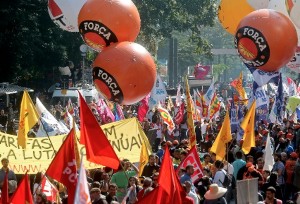

Follow us on:  
|


Unions are demanding changes in the social security regulations, pay hikes, reduction in work hours, and better pensions [Xinhua]
The unions are demanding changes in the social security regulations, pay hikes, reduction in work hours, and better pensions.
Highways linking the big Brazilian cities of Rio de Janeiro and Sao Paulo, along with 20 other roads, were affected by the strikes on Thursday’s ‘Day of Struggle’.
Santos, Itaguai and Suape were cut off with no cargo reaching these ports due to the strikes.
Public transportation was unavailable in state capitals like Belo Horizonte and Porto Alegre where bus and subway workers had joined the strikes.
Brazilian media group Globo’s G1 news site reported demonstrations were held in 156 cities.
In some cities teachers’ associations had also joined the strikes.
Thousands also demonstrated in front of the National Congress in Brasília.
Brazilian daily Folha de S.Paulo reported that a Molotov cocktail was thrown at police who then responded by firing tear gas.
New York-based Brazilian journalist Fernanda Bak says Brazil is enormous, and so are its paradoxes.
“Is Brazil’s future to be comprised of first-world stadiums and third-world education and health systems?” Bak asks in an article for The BRICS Post.
“It is undeniable that Brazilian society has grown more aware of the country’s economic and political realities,” she added.
In June, Brazil was brought to a standstill by hundreds of protests across the country demanding better public services.
With inputs from Agencies